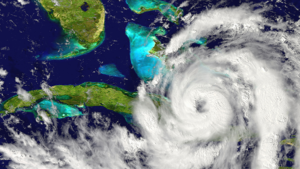
Hurricanes can be one of nature’s most destructive phenomena.
Weather forecasters predict above-average activity for this Atlantic hurricane season, which runs from June 1 to November 30. Take steps to minimize damage and speed recovery.
First and foremost, take whatever precautions are necessary to protect yourself and those around you. While property preparations are important, they are not worth risking life or health. If you need to evacuate, do so, as long as you have time to get to a safe place. Do not get stuck in your car on roads or try to drive through water-covered streets. You can track hurricanes through the National Hurricane Center. Once a storm approaches your area, stay inside, away from windows and possible flying debris.
If you have enough time, here are some simple things you can do to prepare your home or business:
property
Clean your drains. Remove leaves and other debris, first by hand to get rid of large particles and then with a scraping tool and water hose. This helps prevent overflow that can cause internal damage.
Make sure downspouts and window drains properly guide water away from the structure. Direct downspouts at least 6 feet from foundation. Remove any obstacles.
Clear your yard and outdoor areas of potential flying debris. Store lawn furniture, potted plants, bicycles, trash or other loose items.
Protect your windows and glass doors. If you have a functional shutter, secure it.
Move business and construction vehicles to higher ground. Keeping vehicles and other movable property out of harm’s way can reduce the downtime your organization faces and get you back in business sooner after the storm has passed. Building contractors and safety managers can find additional details on securing your construction site in the Loss Control Services section of our website.
Tools and supplies
Test your generator or battery backup. Be prepared for extended power outages, especially if you have electrically powered medical equipment. Store excess fuel safely and only in approved containers. Do not operate portable gas generators indoors or in enclosed spaces where they can lead to carbon monoxide poisoning.
Charge your cell phone and any extra batteries. Adjust settings to remove non-essential apps and save battery life. Store emergency phone numbers in your contacts, including family members, your doctor, your insurance agent, and your insurance company’s claims phone number. Keep a paper copy in case you lose power.
Stock up on flashlights, spare batteries, food and water. Keep your emergency kit stocked with provisions for each family member. Don’t forget your pet. Keep extra diapers on hand for younger babies.
Check your first aid kit. Keep it stocked with the basics to treat minor scrapes or injuries; In the event of a disaster, emergency medical services may be limited to life-threatening cases. Keep a few days’ supply of prescription medications on hand.
Know where your emergency shutoff valve is located. In the event of a loss, you may need to cut off electricity, water or gas.
General preparations
Understand the coverage provided in your insurance policy. No one should be surprised that things like “flood” and “earth motion” may be limited or excluded under some insurance policies. If something isn’t clear to you, contact your agent and get clarification on what your policy will provide you with.
Store a copy of your insurance policy. It’s best to keep a copy offsite, in a safe deposit box, or digitally in a location you can access from anywhere. If you must move, carry copies of key documents including birth certificates, marriage records, property deeds, bank accounts, etc. with you.
Identify safe places in your home or workplace. Know where to get away from windows, skylights, and glass doors if the storm spawns a tornado.
Keep a property inventory. If a hurricane is imminent, it may be too late to fully document your belongings, but taking cellphone photos of each room can also help if you need to file an insurance claim later.
Related information
More information is available in some of our blog posts; A selection of our information is available on our Prepare for Hurricanes page.
These websites have additional preparation tips and advice:
Department of Homeland Security’s Ready.gov site
National Weather Service Hurricane Preparedness Page
This loss control information is advisory only. The author assumes no responsibility for the management or control of loss control activities. Not all exposures are identified in this article. For policy and coverage questions, contact your local, independent insurance agent.